 Petzlover
Petzlover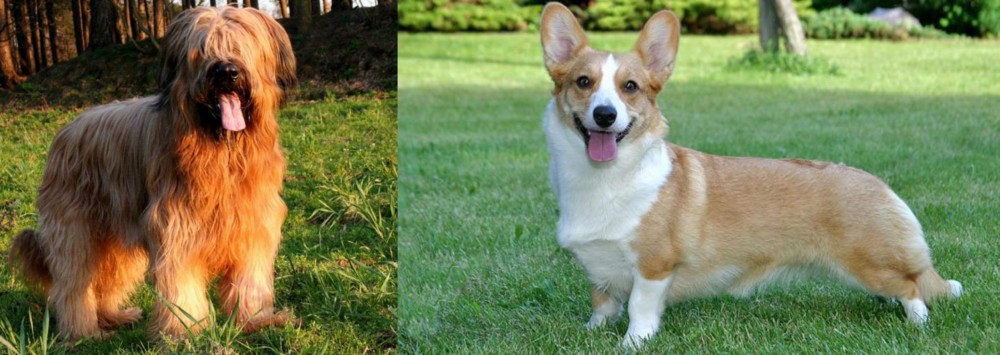 Briard is originated from France but Cardigan Welsh Corgi is originated from United Kingdom. Briard may grow 36 cm / 15 inches higher than Cardigan Welsh Corgi. Briard may weigh 26 kg / 58 pounds more than Cardigan Welsh Corgi. Briard may live 3 years less than Cardigan Welsh Corgi. Briard may have more litter size than Cardigan Welsh Corgi. Briard requires High Maintenance. But Cardigan Welsh Corgi requires Low Maintenance
Briard is originated from France but Cardigan Welsh Corgi is originated from United Kingdom. Briard may grow 36 cm / 15 inches higher than Cardigan Welsh Corgi. Briard may weigh 26 kg / 58 pounds more than Cardigan Welsh Corgi. Briard may live 3 years less than Cardigan Welsh Corgi. Briard may have more litter size than Cardigan Welsh Corgi. Briard requires High Maintenance. But Cardigan Welsh Corgi requires Low Maintenance
 Through myth and legend, the Briard is thought to be a very ancient dog. A French herding breed, a Briard type of dog appears in writings as early as the end of the 14th century. According to legends the Briard was owned by Napoleon, Charlemagne, Lafayette and Thomas Jefferson. As a cross between the Barbet and the Beauceron, the Briard came into popularity following its appearance in a Paris dog show in 1863. Bred originally to guard and herd sheep, these intelligent, independent dogs were often left on their own. Because they both guarded and herded, their size and structure as well as their personalities were different from other dogs that worked sheep. Those that herded only were fast, agile and smaller. Those that only guarded were heavier, bigger and stronger. The Briard was in-between these two types of breeds. He was well suited to any kind of farm work and guarded the crops from the sheep’s desire to eat them. They moved the sheep from one grazing area to another and then to their holding area at night. No humans had to assist the Briard in this work once they were trained.
Through myth and legend, the Briard is thought to be a very ancient dog. A French herding breed, a Briard type of dog appears in writings as early as the end of the 14th century. According to legends the Briard was owned by Napoleon, Charlemagne, Lafayette and Thomas Jefferson. As a cross between the Barbet and the Beauceron, the Briard came into popularity following its appearance in a Paris dog show in 1863. Bred originally to guard and herd sheep, these intelligent, independent dogs were often left on their own. Because they both guarded and herded, their size and structure as well as their personalities were different from other dogs that worked sheep. Those that herded only were fast, agile and smaller. Those that only guarded were heavier, bigger and stronger. The Briard was in-between these two types of breeds. He was well suited to any kind of farm work and guarded the crops from the sheep’s desire to eat them. They moved the sheep from one grazing area to another and then to their holding area at night. No humans had to assist the Briard in this work once they were trained.
During World War 1, the Briards were drafted into service as messengers, sentries and search dogs for lost or injured soldiers. In that time frame the breed served almost to the point of extinction. Breeding programs following the war brought them back. Today the Briard is a home companion, a police dog, as well as both military and civilian search and rescue dogs.
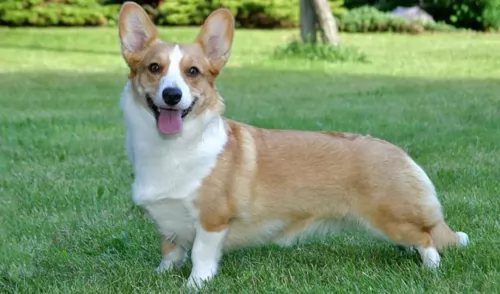 The Cardigan Welsh Corgi, named after Cardiganshire, Wales, is an ancient breed, brought to Wales by the Celts about 3,000 years ago.
The Cardigan Welsh Corgi, named after Cardiganshire, Wales, is an ancient breed, brought to Wales by the Celts about 3,000 years ago.
Small but tough, the Cardigan used to take part in cattle drives and his duties extended to protecting them at night.
The first pair of breeding Cardigans arrived in the United States in June 1931. The AKC granted full recognition to the breed four years later.The Cardi, as the breed is commonly called, was developed as an all-around farm dog in Wales. It is believed to be a descendant of the Pomeranian, Schipperkes, Keeshond and Swedish Valhund.
The Cardigan and the Pembroke Welsh corgis were separated officially into different breeds in the early 1930s. AKC recognition came in 1935.
 The Briard is a powerful, intelligent and independent working dog. They have a straight topline and their height is almost the same as their length. They have long, large, rectangular heads with wide muzzles. Their noses are also square and jet black while their side set, large eyes can be black-brown or black. Their ears have traditionally been cropped but with more countries outlawing it, they can now have natural ears set high on the head. They have a tail that is feathered and low-cut. The feet of a Briard are round, compact and large.
The Briard is a powerful, intelligent and independent working dog. They have a straight topline and their height is almost the same as their length. They have long, large, rectangular heads with wide muzzles. Their noses are also square and jet black while their side set, large eyes can be black-brown or black. Their ears have traditionally been cropped but with more countries outlawing it, they can now have natural ears set high on the head. They have a tail that is feathered and low-cut. The feet of a Briard are round, compact and large.
The Briard is a double coated breed with a long beard and mustache. Their hair completely covers the head and the eyes so that they are not seen. They have prominent eyebrows as well.
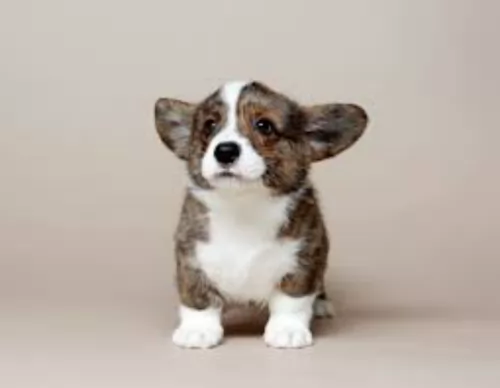 The long-shaped Cardiganshire Welsh Corgi is also nicknamed the ‘yard-long dog’ in Wales. Don’t be fooled by this low-to-the-ground dog, because when you look at him he isn’t a small dog at all, looking almost like a German shepherd with short legs, upright ears and a long, bushy tail.This is unlike the Pembroke Welsh Corgi whose tail is traditionally docked.
The long-shaped Cardiganshire Welsh Corgi is also nicknamed the ‘yard-long dog’ in Wales. Don’t be fooled by this low-to-the-ground dog, because when you look at him he isn’t a small dog at all, looking almost like a German shepherd with short legs, upright ears and a long, bushy tail.This is unlike the Pembroke Welsh Corgi whose tail is traditionally docked.
The Cardi stands around 270 to 330mm tall at the withers and weighs between 11 to 17kg. With those short legs he can gather up quite a speed as well. The dog has a double coat in fawn, red, black and with the outer coat being of medium length and quite harsh to the touch. You can also find some white on the neck, chest as well as on the legs.
The Cardigan Welsh Corgi is full of spirit and makes a fantastic companion for someone looking for a fun-loving, devoted friend. He is an easy going dog, making a wonderful pet, while being reserved with strangers. He isn’t a tall dog but he will guard the family too. He is good with children in the family and even with other pets, provided he is trained and socialized.
 As mentioned previously the Briard is intelligent and independent. They are also loyal, rugged, protective and bond intensely with their humans. They are often aloof when it comes to strangers or even when new furniture is introduced into the household. They have to learn that anything new into the family environment is friendly and good. They are great with children and susceptible to separation anxiety because of their deep affection for their people. Socialization for puppies is a must. This will let them know that people and children, other dogs in general are not harmful to their families. They have great memories and once they learn something – right or wrong – it is almost impossible to change it. They were bred to be independent thinkers who acted on their own conclusions. This is still true of the breed today, making them appear to be stubborn.
As mentioned previously the Briard is intelligent and independent. They are also loyal, rugged, protective and bond intensely with their humans. They are often aloof when it comes to strangers or even when new furniture is introduced into the household. They have to learn that anything new into the family environment is friendly and good. They are great with children and susceptible to separation anxiety because of their deep affection for their people. Socialization for puppies is a must. This will let them know that people and children, other dogs in general are not harmful to their families. They have great memories and once they learn something – right or wrong – it is almost impossible to change it. They were bred to be independent thinkers who acted on their own conclusions. This is still true of the breed today, making them appear to be stubborn.
They are great watchdogs, fearless and brave; willing to learn, eager to make you happy. They are basically gentle but that always runs up against their protective nature. A strong alpha leader is needed to handle this hard-working dog.
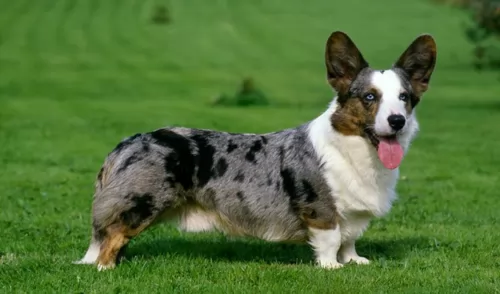 The Cardigan Welsh Corgi is full of surprises and he has been a strong working job, being quick and agile around cattle. He is good at everything and with training and socialization he is going to make an excellent pet.
The Cardigan Welsh Corgi is full of surprises and he has been a strong working job, being quick and agile around cattle. He is good at everything and with training and socialization he is going to make an excellent pet.
They are good with children and other pets and he makes an excellent guard dog as well. He is strong willed and feisty but he wants to please his owner. With a dog like this in your life, you’re going to have a faithful and loving friend who knows how to entertain you as well with his antics.
 Being a large breed, the Briard shares many of the same health concerns as other large breeds. They have a few of their own as well. Typical issues for a Briard might include:
Being a large breed, the Briard shares many of the same health concerns as other large breeds. They have a few of their own as well. Typical issues for a Briard might include:
Progressive Retinal Atrophy/Degeneration –degeneration of the photoreceptors and retina.
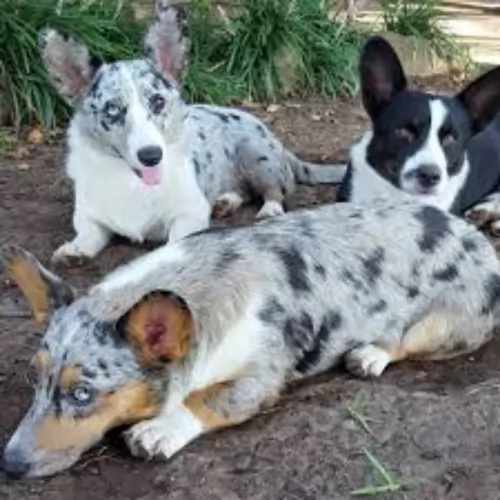 The Cardigan Welsh Corgi is a generally healthy breed with an average lifespan of 12-15 years. Like all dogs, they will have some health concerns, and recognizing the symptoms of some common dog illnesses can spare your pet.
The Cardigan Welsh Corgi is a generally healthy breed with an average lifespan of 12-15 years. Like all dogs, they will have some health concerns, and recognizing the symptoms of some common dog illnesses can spare your pet.
This is a debilitating genetic joint condition that can affects any dog really. It occurs when the hind leg joint isn’t held properly by the hip socket. Bone is worn away and your dog can experience severe pain.
Unfortunately this is a common skeletal disorder and your pet will be reluctant to jump or play. Untreated, it can lead to arthritis and chronic pain, making him immobile. There are several types of treatments and you want to get your pet to the vet to relieve him of pain and discomfort.
This is a terrible disease for your pet because the rear legs can actually become paralyzed and your pet won’t be able to control their bowels. It is an inflammatory autoimmune disease where the dog’s immune system cells attack the spinal cord sheath. If your vet suspects Degenerative Myelopathy, a blood sample will be required. Sometimes the dog has to be mercifully euthanized. Sometimes people even turn to holistic treatments to avoid this and help their pet.
 It is best to feed the Briard smaller meals 2-3 times a day to prevent bloat. Feed 3-4 cups total for the day of a dry dog food that is high quality and made for large breeds.
It is best to feed the Briard smaller meals 2-3 times a day to prevent bloat. Feed 3-4 cups total for the day of a dry dog food that is high quality and made for large breeds.
Stationary Night Blindness – Congenital limited vision in the dark can vary from slight difficulty moving to complete inability to see in the dark.
Progressive Retinal Atrophy/Degeneration – Can lead to night blindness, limited or total blindness. Puppies with the disease can be blind before their first birthday.
Bloat (Gastric Torsion) – Stomach is distended and twists. Fatal if not treated quickly. Caused by eating a large meal quickly and either exercise immediately or drink a large amount of water right after eating.
Von Willebrand’s Disease – Blood clotting disorder leads to excessive bleeding. There is no cure, but it is manageable.
The Briard is a working dog and as such needs a job. They excel at agility, flyball, herding, obedience, confirmation and tracking. They need exercise and make excellent service dogs for people with disabilities and therapy dogs for those in emotional need.
 Cardigan Welsh corgis are active dogs and he is going to need daily exercise. He’ll love a walk with you and will show you how agile he is when you throw a ball for him
Cardigan Welsh corgis are active dogs and he is going to need daily exercise. He’ll love a walk with you and will show you how agile he is when you throw a ball for him
The Cardigan is a low maintenance dog. His thick double coat does shed quite a bit but nonetheless it is easy to maintain. Simply give it a good brush to remove loose hairs and to get rid of dirt. This brushing distributes the dogs natural oils and helps to keep the coat shiny and healthy.